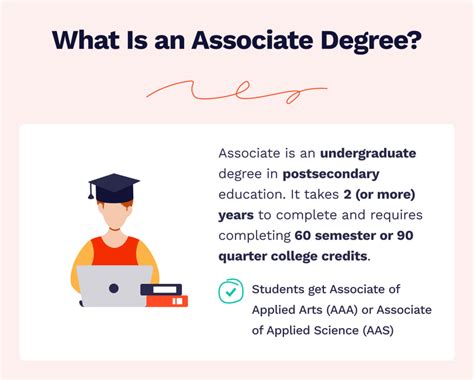Pursuing an associate degree is a significant step towards enhancing your career prospects and expanding your knowledge. Before embarking on this academic journey, it’s essential to familiarize yourself with the requirements you must fulfill.

Educational Qualifications
The first step in earning an associate degree is meeting the educational prerequisites:
-
High School Diploma or Equivalent: Most institutions require you to hold a high school diploma or a General Education Development (GED) certificate as evidence of completing secondary education.
-
Placement Exams: Some colleges may require you to take placement exams to assess your math and English skills. These exams help determine the appropriate level of courses for you.
-
Transfer Credits: If you have taken college-level courses in the past, you may be eligible to transfer credits towards your associate degree. Transferability of credits varies among institutions, so it’s important to consult with the admissions office.
Program Requirements
Associate degrees offer specialized training in various fields. The specific requirements for each program may differ depending on the institution and the subject matter:
-
Core Curriculum: All associate degree programs include a core curriculum consisting of foundational courses in areas such as math, English, science, and social sciences.
-
Major Concentration: You will choose a specific major to focus your studies, such as business, nursing, or information technology. Courses within the major will provide you with in-depth knowledge and skills in your chosen field.
-
Electives: Electives give you the flexibility to explore other areas of interest or fulfill general education requirements.
Time Commitment
An associate degree typically takes two years to complete, assuming full-time study. The exact length of time may vary depending on the pace of your studies, the number of transfer credits you have, and any work or family commitments you may have.
-
Semester System: Most associate degree programs follow a semester system, with two semesters per year. Each semester is typically 15 weeks long.
-
Quarter System: Some institutions use a quarter system, with four quarters per year. Each quarter is typically 10 weeks long.
-
Part-Time Study: If you are unable to commit to full-time study, you can opt for part-time enrollment, which will extend the completion time.
Cost and Financial Aid
The cost of an associate degree varies widely depending on the institution, the program, and your residency status. Consider the following factors:
-
Tuition and Fees: Tuition covers the cost of instruction, while fees may include technology fees, registration fees, and other miscellaneous expenses.
-
Books and Supplies: You will need to purchase textbooks, course materials, and other supplies for your classes.
-
Financial Aid: Explore various financial aid options such as scholarships, grants, loans, and work-study programs to offset the cost of your education.
Career Opportunities
An associate degree opens up a range of career opportunities. Here are a few examples:
-
Business: Associate degree holders in business find employment in fields such as accounting, finance, marketing, and human resources.
-
Healthcare: Graduates with associate degrees in nursing, allied health, and medical assisting can work in hospitals, clinics, and other healthcare settings.
-
Information Technology: Associate degree programs in computer science, information technology, and network administration prepare students for roles in software development, tech support, and network management.
-
Education: Associate degrees in early childhood education, elementary education, and special education provide pathways to teaching at the pre-K through 12 levels.
Tips for Success
Embarking on an associate degree program requires dedication and hard work. Here are some tips to help you succeed:
-
Set Clear Goals: Define your career objectives and how an associate degree will contribute to your goals.
-
Manage Your Time: Create a study schedule and stick to it. Break down large assignments into smaller tasks.
-
Attend Class Regularly: Attending class regularly is crucial for staying on top of the material and participating in discussions.
-
Seek Help When Needed: Don’t hesitate to ask for help from your professors, classmates, or the academic support center.
-
Network and Build Relationships: Engage with your classmates, professors, and professionals in your field to expand your connections.
Conclusion
An associate degree is a valuable investment in your future. By understanding the requirements, choosing a reputable institution, and implementing effective strategies, you can successfully navigate your associate degree journey and reap the rewards of a rewarding career.
